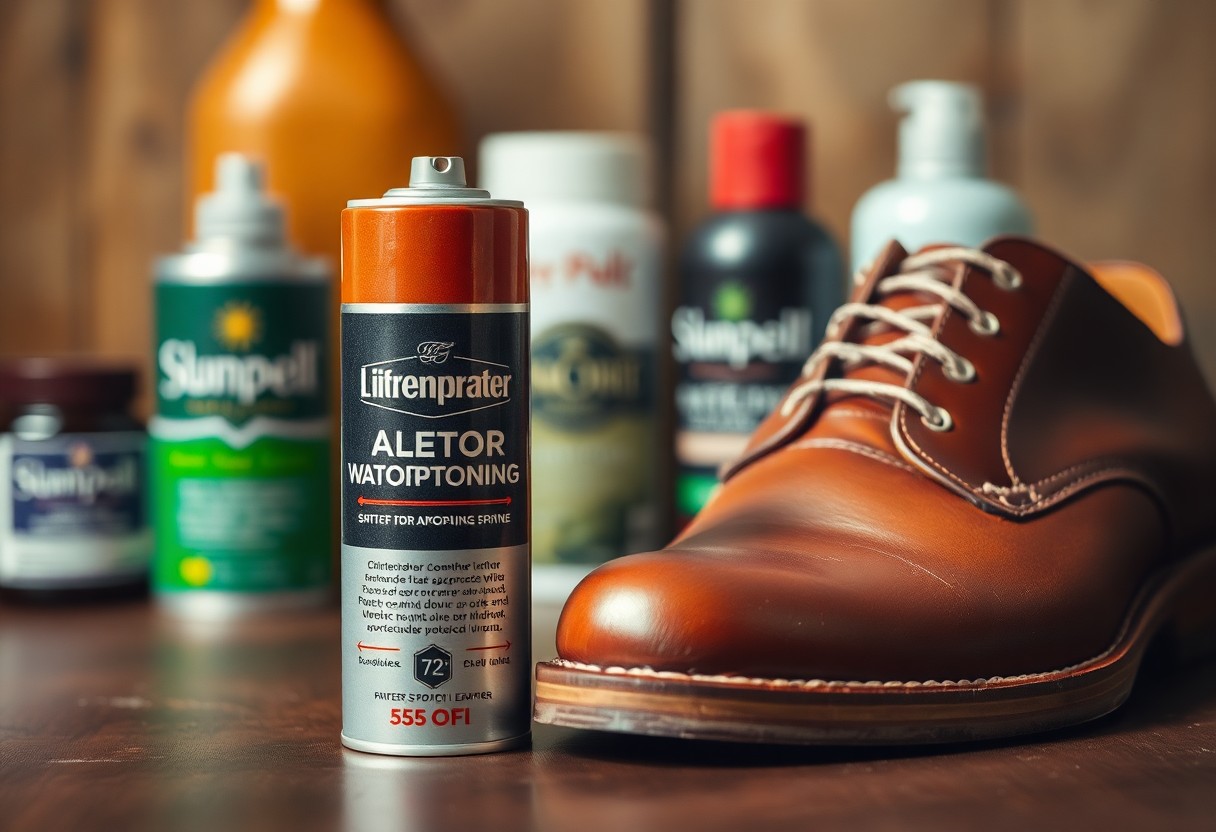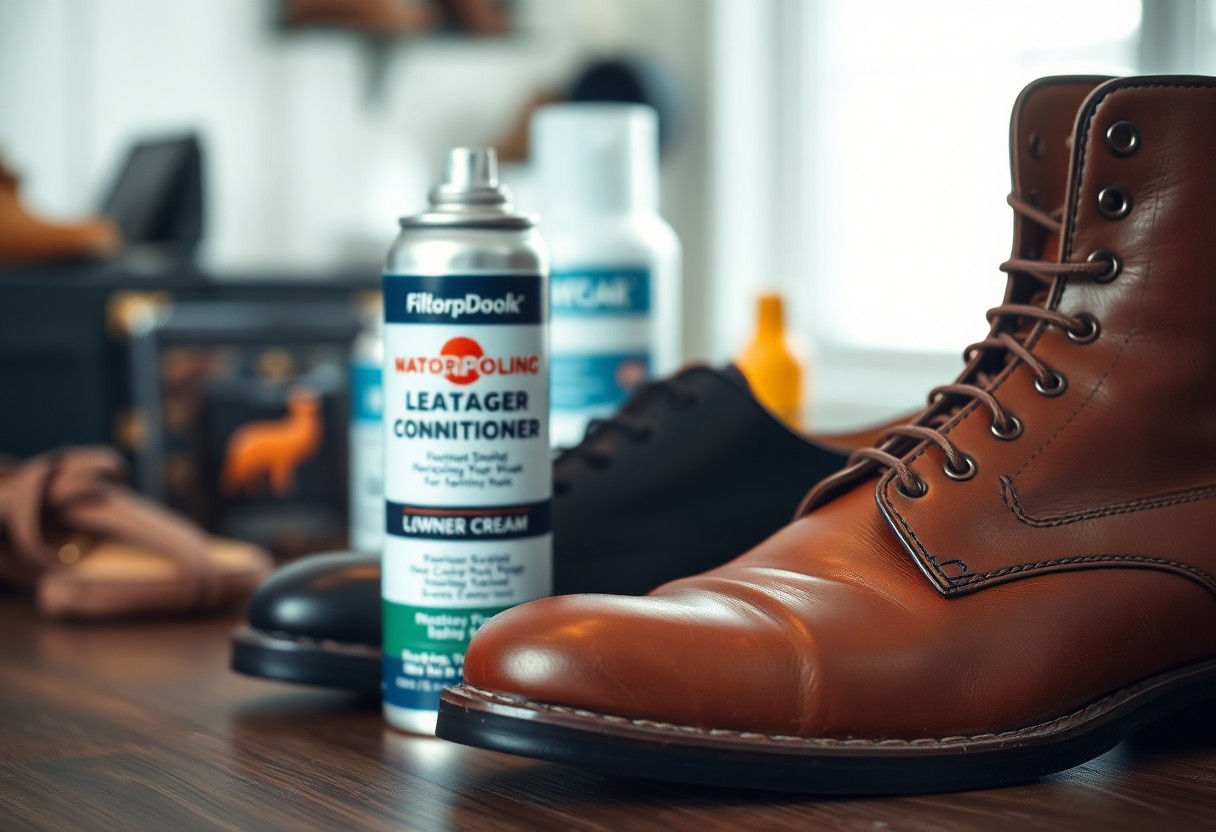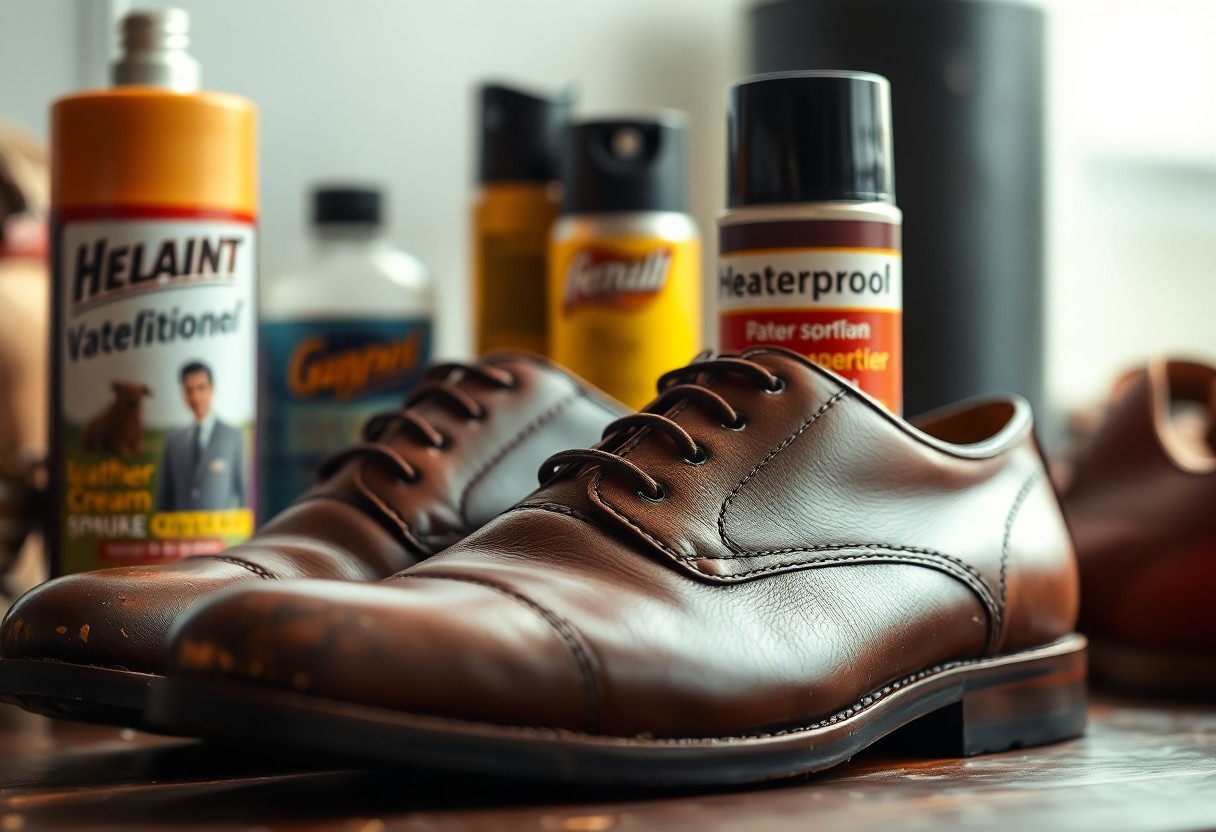Leather care mistakes can lead to irreversible damage to your prized footwear. A prevalent error is using waterproofing spray on smooth leather. While these sprays might appear to offer a quick solution for shielding your shoes from moisture, they actually hinder essential nutrients from penetrating the leather, which can cause it to dry out and develop cracks over time. Smooth leather shoes are designed with inherent water-resistant features thanks to their grain layer and require proper nourishment through shoe creams and waxes to ensure their durability. Instead of relying on sprays, opt for high-quality leather conditioners and wax polishes that both protect and nourish the leather, ensuring its longevity while preserving its natural beauty.
Understanding the Essential Basics of Protecting Leather for Enhanced Longevity
To maximize the lifespan of your leather items, it’s crucial to grasp their protective characteristics thoroughly. Full grain leather possesses natural water-resistant properties due to its tightly woven fiber structure. However, these qualities necessitate regular and meticulous upkeep to remain effective. The durability of your leather is directly linked to the care it receives. Utilizing waterproofing sprays can impede the leather’s ability to breathe, potentially leading to significant damage if not managed properly over time.
Discovering the Exceptional Advantages of Full Grain Leather
After the tanning process, full grain leather retains its original surface layer, which offers unparalleled natural protection. Items crafted from this material preserve an intact grain layer, providing resistance against moisture and wear. This protective top layer is rich in natural oils and fibers that form a barrier, making additional waterproofing sprays unnecessary and potentially detrimental to the leather’s health.
Understanding How Leather Manages Moisture and Ages Gracefully
Grain leather must maintain its ability to absorb and expel moisture effectively. The pores within your leather enable it to breathe and manage moisture, helping to keep it supple and preventing unsightly cracks. However, the application of waterproofing sprays can seal these pores, limiting vital airflow and disrupting the natural moisture equilibrium. Additionally, as leather ages, it necessitates appropriate nourishment through conditioning products. When waterproofing sprays are applied, they create a barrier that prevents essential conditioning oils from reaching the leather, leading to dryness and brittleness over time. Regularly applying leather cream helps your leather age beautifully, developing a rich and desirable patina.

Identifying the Risks Associated with Waterproofing Spray Usage
Many individuals mistakenly perceive waterproofing spray as the ultimate solution for protecting their leather shoes, but this widespread practice can lead to significant damage to your footwear. While these sprays offer an immediate protective barrier against moisture, they simultaneously block essential nutrients from penetrating the leather, paving the way for long-term deterioration.
Debunking Common Myths Fueled by Marketing Misconceptions
Due to aggressive marketing strategies and well-meaning guidance from retail staff, you might believe that waterproofing spray is essential for every type of leather shoe. This misunderstanding has been perpetuated by numerous shoe retailers, primarily driven by the high profit margins and frequent re-purchase rates of these products. However, the reality is that regular smooth leather possesses natural protective qualities that do not necessitate additional spray-on barriers for effective safeguarding.
Evaluating Immediate Benefits Against Long-Term Consequences
The deterioration of your leather shoes begins when waterproofing sprays form a barrier that prevents essential oils and conditioning agents from penetrating the leather. Although you may initially notice improved water resistance, the reality is that your leather will gradually become dry and brittle without the vital nourishment it needs. The repercussions of using waterproofing sprays on smooth leather extend far beyond surface-level protection. Your leather requires consistent nourishment to maintain its flexibility and durability. When shoe creams and conditioners cannot penetrate the leather due to the spray barrier, the material risks cracking and deterioration, ultimately significantly reducing your shoes’ lifespan. Natural waxes and appropriate conditioning offer superior long-term protection while nurturing the leather’s health.

Exploring the Science Behind Effective Leather Care Techniques
A fundamental aspect of successful leather care involves understanding its molecular structure. The collagen fiber networks within your leather shoes require both protection and nourishment. The products you choose can either coat these fibers or effectively penetrate them. This interaction is essential for the long-term health of your leather footwear.
Recognizing the Importance of Regularly Nourishing Leather
It’s vital to acknowledge that your leather shoes require consistent nourishment to sustain their quality. The natural oils found in your leather help prevent cracking and maintain flexibility. Over time, these oils diminish due to regular wear and exposure to various environmental factors. To preserve the leather’s structural integrity, replenishing these oils through diligent conditioning is crucial.
Understanding the Barrier Effects Created by Waterproofing Sprays
A significant drawback of waterproofing sprays is their tendency to create a barrier. When applied to smooth leather, these sprays form an impermeable layer that obstructs both moisture and essential nutrients. This barrier prevents your leather care products from effectively penetrating the surface, resulting in a gradual decline in the leather’s quality over time.
The barrier effect of waterproofing sprays creates a problematic cycle for your shoes. While these sprays effectively block moisture, they also inhibit the absorption of essential conditioning products that are necessary for maintaining the leather’s health. Consequently, the leather may appear protected on the surface but is effectively becoming dehydrated and brittle beneath. Silicone-based sprays are particularly harmful, forming a permanent barrier that is challenging to remove without damaging the leather.
Implementing Effective Leather Protection Strategies for Optimal Care
Contrary to popular belief, your smooth leather shoes require specific care techniques that align with the natural properties of full-grain leather. The ideal approach combines traditional methods with products designed to enhance the leather’s inherent protective qualities, ensuring both immediate defense and lasting durability for your footwear.
Utilizing the Benefits of Wax-based Solutions for Protection
A highly effective alternative to waterproofing sprays is the use of premium wax-based products. These solutions work in harmony with your leather’s natural grain rather than against it. The application of wax polish creates a protective barrier that still allows the leather to breathe, making it especially advantageous for toe caps and high-wear areas.
Enhancing Leather Quality Through Consistent Cream and Conditioner Application
Unlike conventional spray treatments, leather creams and conditioners provide essential nourishment while preserving the leather’s natural protective capabilities. Your shoes benefit from oils that penetrate deeply into the material, helping to prevent drying and cracking. Furthermore, regular application of cream and conditioner creates a cumulative effect that enhances leather quality over time. The natural oils in these products bolster the leather’s flexibility and strength, allowing it to develop a beautiful patina. It’s advisable to apply these products every 4-6 wears to maintain optimal leather condition.

Identifying Appropriate Usage for Waterproofing Spray
Unlike smooth leather, certain materials greatly benefit from waterproofing sprays. These products create an effective water-resistant barrier on specific materials that lack inherent protection. Waterproofing sprays are particularly beneficial for suede, nubuck, and various textiles, where the material structure does not offer natural moisture resistance.
Enhancing Suede and Nubuck Durability with Waterproofing Spray
By treating your suede or nubuck footwear with waterproofing spray, you significantly improve their resistance to moisture damage. Although many contemporary suede materials come pre-treated with factory waterproofing, additional protection can help maintain this defense over time. The application of spray establishes a protective barrier that effectively prevents water from penetrating these delicate materials.
Providing Optimal Protection for Textile Footwear Against Moisture
In addition to leather alternatives, textile footwear requires specialized protection against moisture damage. Materials such as canvas, mesh, and synthetic fabrics can achieve enhanced water resistance through proper spray application. Most textile materials are naturally absorbent, making them susceptible to water damage and staining.
Moreover, waterproofing sprays formulated for textiles help retain the shape and color of your shoes. The barrier they create also prevents dirt and debris from embedding in the fabric fibers. It’s advisable to reapply the spray every 3-4 months for optimal protection, depending on the frequency of use and prevailing weather conditions.
Expert Insights and Recommendations for Effective Leather Care
Not all leather treatments yield the same results. Experts in leather care strongly advise against the use of waterproofing sprays on smooth leather. Your full-grain leather shoes need specialized care that allows them to breathe and absorb nourishing treatments. Using inappropriate products can lead to leather damage that could cost hundreds of dollars.
Insights from Tannery Specialists on Leather Maintenance
To maintain the quality of leather, tannery specialists emphasize that full-grain leather naturally possesses water-resistant properties in its outer layer. Preserving the leather’s protective qualities requires the application of oils and waxes. Waterproofing sprays can block these essential treatments from penetrating the leather.
Guidance from Professional Cobblers on Extending Leather Lifespan
For the long-term care of leather, professional cobblers advocate for the use of wax-based products instead of waterproofing sprays. Your shoes will thrive with treatments that both protect and nourish the leather. Data indicates that 90% of premature leather damage arises from the use of incorrect care products.
By adhering to proper leather care practices, your shoes could endure an impressive 15-20 years rather than just 2-3 years with subpar maintenance. Traditional wax treatments allow leather to retain its natural qualities while ensuring adequate moisture protection. Your investment in high-quality leather footwear demands meticulous care that preserves both aesthetic appeal and durability.
Crucial Takeaways for Effective Leather Care Practices
In summary, your smooth leather shoes require appropriate care that steers clear of waterproofing sprays. Instead, opt for shoe creams and waxes that nourish the leather while providing effective moisture protection. Full-grain leather inherently possesses natural protective qualities due to its grain layer, and waterproofing sprays may obstruct essential oils from penetrating the leather, leading to dryness and cracking. Reserve waterproofing sprays for suede, nubuck, or textile footwear where they can be most beneficial. By selecting the right products, you can safeguard your leather shoes while enhancing their longevity.
Your Leather Care Queries Addressed
Q: Why is waterproofing spray detrimental to smooth leather shoes?
A: Waterproofing spray creates a barrier on leather that obstructs essential oils and conditioners from penetrating the material. While it provides moisture protection, it also inhibits the necessary nourishment of the leather, leading to dryness and potential cracking over time, ultimately compromising the lifespan of the shoes.
Q: What alternatives should I consider instead of waterproofing spray for smooth leather shoes?
A: Consider utilizing a combination of shoe cream and wax polish. Shoe cream delivers essential oils to nourish the leather, while wax polish forms a protective layer that aids in repelling moisture. This method works in tandem with the natural protective properties of full-grain leather, preserving the leather’s health while providing effective water resistance.
Q: Which types of footwear can I safely apply waterproofing spray to?
A: Waterproofing spray is suitable for materials such as suede, nubuck, and textiles. These materials lack the natural protection found in smooth leather, thus benefiting from the barrier created by waterproofing sprays. Many modern suede and nubuck materials may already have factory waterproofing treatments, but additional applications can enhance and maintain this level of protection.
The Article Why you shouldn’t use waterproofing spray on regular smooth leather and better alternatives appeared first on My Shoes Finder
The Article Waterproofing Spray on Smooth Leather: Risks and Alternatives Was Found On https://limitsofstrategy.com
The Article Waterproofing Spray Risks and Alternatives for Smooth Leather First Appeared ON
: https://ad4sc.com


Comments are closed